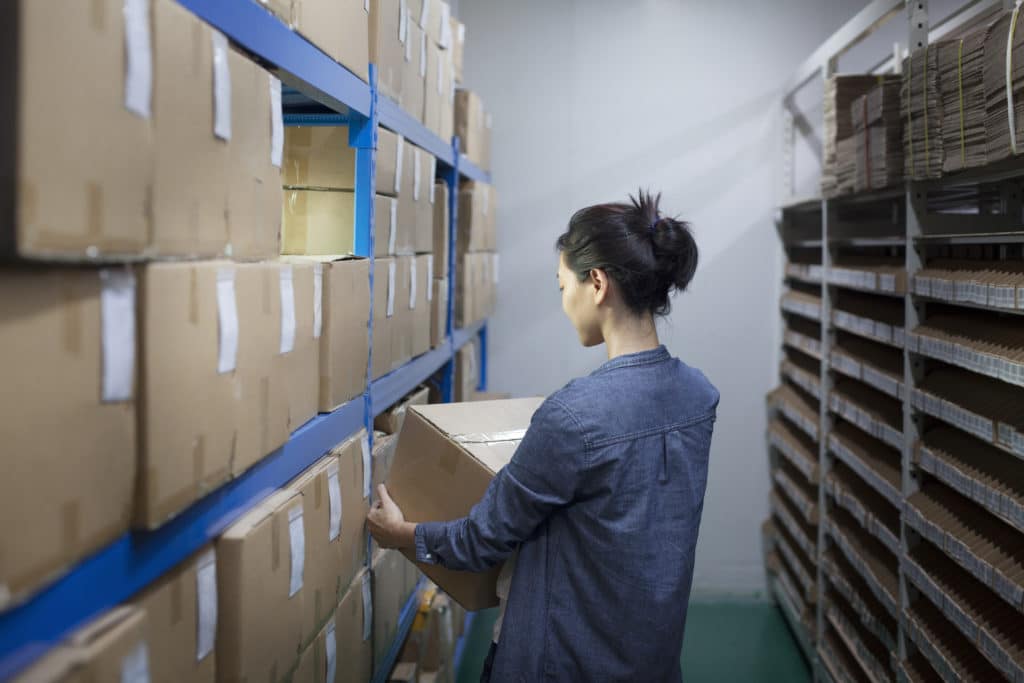3PL for Startups: Why New Businesses Need Fulfillment Services and How to Choose the Best One

There’s nothing more exciting than watching your new eCommerce business get off the ground.
I’m sure you remember it well: that notification of your first sale rolling in, being able to tell your friends that you’re a small business owner – there’s nothing quite like it.
Your startup is your baby. But you didn’t start your venture to be a full-time warehouse manager, swimming in boxes and shipping labels.
Before you know it, you’re spending all your time working in your business as opposed to on your business. The way to avoid this is to delegate the necessary, but tedious work to subject matter experts. That’s where third-party logistics (3PL) comes in.
Why Logistics are Important to Startups
3PL for startups can feel intimidating. Outsourcing fulfillment operations may seem like something reserved for big corporations.Plus, you may not even have a comprehensive, scalable order fulfillment strategy in place to begin with.
To cap it all off, the fear of delegation is real (and very normal), especially for small eCommerce businesses.
We’ve written extensively on what 3PL is and how it works for eCommerce businesses. If you want to go deeper into the intricacies of the fulfillment process, click those links to open those articles in new tabs and read them after this one.
In summary, a 3PL provider manages all or a portion of your organization’s supply chain in exchange for a recurring or per-purchase fee.
They cover all the storage, packing, processing, and picking of your products. The cherry on top is that most 3PL providers will also handle reverse logistics (returns and customer service tasks).
We get it. The thought of handing off any aspect of your day-to-day operations to someone else is scary. But if you want to scale, reach more customers, and breakthrough revenue ceilings, creating a team around your brand is the only way to get there.
Here are some more reasons why your startup should leverage fulfillment services.
3PL Companies Help Startups Scale More Intelligently
The number one enemy of scale is a lack of systems, processes, and a team. Many eCommerce startup owners are solopreneurs or part of small teams.
Until we figure out a way to clone ourselves or slow downtime, you cannot grow if you’re doing everything yourself. There’s only one of you and only 24 hours in a day.
If there’s one thing I’ve learned from growth-minded eCommerce businesses, it’s that trying to be a jack of all trades and do everything yourself will sabotage your growth.
Focusing on the things we mentioned in the last section requires you to free up your time. And freeing up your time requires delegation, processes, and a team. The best things to delegate are repeatable, predictable tasks. Inventory management falls squarely in that category.
Outsourcing to a 3PL can help you focus on things that will actually facilitate growth in your organization.
Logistics Services Help Smooth Out Volatile Sales Patterns
Many eCommerce rely on crowdfunding, uncertain market forces, and a brand-new audience to make their money. Couple that with the fact that they don’t have the benefit of historical sales data.
So how does a 3PL help with this?
Many 3PLs are “elastic” in their fulfillment strategies. Meaning, whether you have slow months or sudden spikes in your traffic, 3PL companies are equipped to handle it.
You no longer need to fear seasonal demand. 3PLs help prevent stock-outs while maintaining a steller delivery experience for your customers.
Small Businesses Need the Space That Fulfillment Centers Offer
Renting out warehouse space is expensive. Plus, who is going to work it? Once again, you’re back to working in your business and not on it.
Making space in your home office or eliminating the need for a warehouse is a massive money-saver (and headache-saver).
3PLs do this full-time. In fact, being the best at storing, picking, and packing inventory is their entire job. So do yourself a favor and free up your workspace. Outsource the clutter to the experts.
[html_blocks id=”20105″]
How Your Startup Can Benefit From Working With an Order Fulfillment Company
All the 3PL benefits we’ve written about in the past apply just as much — if not more — to startups and small businesses. Here they are in summary:
3PLs Can Help You Save Money
You want to make sure any service you invest in will produce a positive ROI for your business. And while 3PLs obviously cost money, they may be saving you far more. How? Opportunity cost and labor savings.
The latter is pretty self-explanatory. It will almost always cost more to hire a full-time warehouse employee than to outsource those responsibilities.
Let’s talk a bit about opportunity cost.
Simply put, opportunity cost is the cost of doing one thing over another. Think of it this way:
We’ve already covered how 3PL companies manage shipments for your business. Let’s say your time is worth $150/hour.
Is picking and packing inventory, sorting through spreadsheets, and printing labels really worth that time?
What if, instead of those tedious tasks, you could be:
- Creating new content for your website
- Optimizing your social media strategy or content strategy
- Entering new markets
- Forming partnerships with influencers
These are the things that will truly drive progress in your business. The initial investment in a 3PL may seem scary, but it could free you up to experience unprecedented growth.
3PLs May Offer Access to Untapped Markets
It’s not uncommon for entire regional markets to be inaccessible to eCommerce businesses due to their managing inventory in-house.
For example, let’s say you own an outdoor clothing brand on the East Coast. You’ve got West Coast fans gearing up to hike in Yosemite, but it makes no sense for them to purchase your product.
Thanks to Amazon, they (like most other consumers) have come to expect two-day shipping. But shipping that weight across the country in two days is astronomically expensive.
You want to lower the cost to get the business, but then you’re cutting deeply into profits. See the problem?
This is why most 3PL providers have warehouses dispersed throughout the country (and sometimes even offer international shipping).
Shopify Fulfillment Network (which we’ve also written about here) is one of those brands that utilizes AI to inform how they distribute inventory. If you sell 20% in the midwest and 80% on the East Coast, they’ll keep corresponding product numbers at those warehouse locations.
This doesn’t need to end with your U.S. reach, though. Many 3PLs have international warehouses as well as domestic ones. This affords the ability to test new markets (all while your 3PL takes care of all the requisite customs and imports responsibilities).
3PLs Improve Customer Satisfaction
In eCommerce fulfillment, excellent customer service isn’t about coupons, discounts, or even recognition. It’s about solving the customer’s pain points as quickly as possible. Most 3PLs will manage the returns and refunds of all fulfilled inventory.
What to Look for When Choosing Distribution Services
We wrote a detailed section on questions to ask your fulfillment provider in this post. In summary, you’ll want to make sure any logistics company you partner with has the following bases covered:
- Reverse logistics capabilities
- Integrations (specifically with your Inventory Management Software)
- Scalability
- Case studies from previous or current customers
- Product assembly and kitting services
- Distributed inventory
- Access to key personnel in the warehouse
- Brokerage options for shipping discounts
- Adequate picking, packing, and storage offerings
Invest in an Inventory Management Software Before Order Fulfillment
What do you do when we want to have both brick-and-mortar product offerings as well as 3PL providers?
After all, as we discovered in our previous posts, it may not always make sense to outsource fulfillment for all your products.
Many 3PL companies offer some sort of reporting interface or dashboard to monitor your inventory movement. However, if you have a multichannel eCommerce strategy, you’ll want something that can aggregate all your channels in one place.
That’s where an IMs like SkuVault comes in — which of course, has built-in integrations for all major 3PL providers.
Having a single source of truth — a flexible, cloud-based inventory system — is absolutely essential for your business growth and success.
Especially if you want to utilize fulfillment services.How Do You Choose the Right 3PL for Your eCommerce Business?
A 3PL is quite literally a strategic business partner. Therefore, making the leap to a vendor should be a deliberate and well-researched endeavor.
Before diving into a relationship with a third-party logistics company, it’s imperative that you’ve got your own house in order, so to speak.
The best way to understand, manage, and streamline your inventory management is through an IMS like SkuVault.
As you introduce more elements into your logistics process, you introduce complexity. We’ve built SkuVault to be a one-stop shop for all inventory fulfillment, forecasting, reporting, and monitoring.
Before you start researching fulfillment vendors, developing your own inventory management system is essential. SkuVault, much like 3PL providers, adapts to your logistics needs and can not only help you grow, but grow with your business.
For an in-depth look at how SkuVault helps you integrate all your sales channels, optimize your inventory management, and grow your business, learn more about our features here.
Or, if you’re ready to dive in, click the Schedule a Demo link to speak with one of our team members about how we can help you get back to working on your business and not in it.
[html_blocks id=”34128″]

